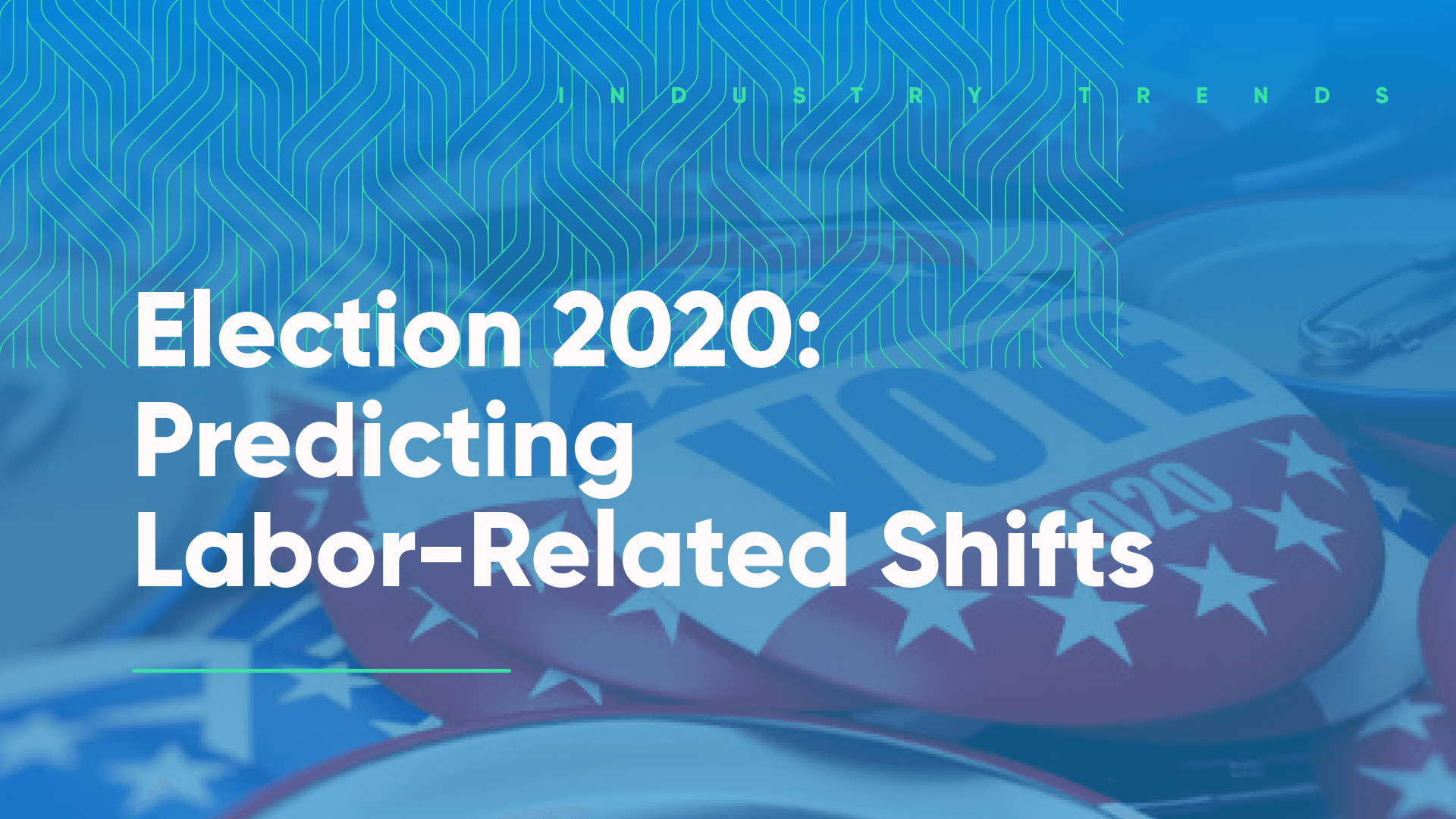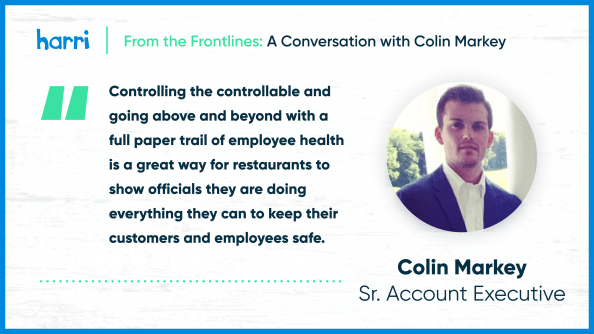Election 2020: Predicting Labor-Related Shifts

- By Harri Insider Team | November 7, 2020
The 2020 Presidential Election will drastically change the direction we head towards in so many respects. including labor shifts and the laws we will live by. This year in particular, the U.S. Labor Department’s agenda hangs in the balance. Regardless of winners and losers, we believe there will be some big changes and impacts coming this way.
A quick overview of how each candidate will affect the hospitality industry
Trump re-election: Pro-business
- Less stringent labor regulations
- Maintain current right-to-work laws
- Decreased limitations on corporations
- Increased immigration limitations
Biden win: Pro-worker
- Abolish Tip Credit
- More power to unions and worker boycotts
- Minimum wage increase across the board
- Rollback on immigration limitations
Read below for a detailed look into these topics.
Wages and Labor Issues
This is one of the biggest sources of contention between the two parties. It is clear that the Biden campaign is committed to expand the minimum wage well beyond what many cities and states are already doing, by raising the federal minimum wage from $7.25 to $15 an hour. However, Biden’s stance on how to handle tip credits may be the bigger issue.
Today, forty-three of the fifty states allow businesses to count their employees’ reported gratuities toward their minimum wage payment. Joe Biden has been vocal about abolishing this tip credit, which would inevitably lead to a significant rise in labor costs of employers who are using this concession to effectively manage their labor expenses. Trump remains quiet on the topic. As an owner of several domestic hotels that take advantage of these tip credits, it’s expected that we will not abolish the practice if re-elected.
The Democractic party, that is supported heavily by the unions, is also looking for ways to facilitate collective bargaining for wages across all industries and pass the PRO (Protecting the right to Organize) Act. This Act will restore workers’ rights, including the right to launch secondary boycotts. Back in 2016, Trump received more votes from union members than any Republican since Ronald Reagan, which is uncommon for a political party that historically does not favor unions.. Hillary Clinton still won a majority of union voters overall, but her numbers were down 10% from former President Barack Obama in 2012. Trump, unsurprisingly, received the most white male union votes, playing a role in his victory. Donald Trump has also used his time as President to adjust the National Labor Relations Board (the federal watchdog on union organizing). The Board shifted into a pro-labor direction under President Obama, but this was quickly changed by Trump.
The restoration of Card Check is also on the table. Card Check is a simplified vote for union representation where employees check one box on a card without confidentially. The concern here is that if people know how their fellow workers are voting, there could be holdouts against collective bargaining. The Democrats are also seeking to repeal the right-to-work law, which ensures an employee is no longer forced to join a union even if the majority of their team members vote to be represented by one.
Immigration
President Trump’s stance on immigration has been to tighten the enforcement of existing laws and add more restrictions where possible. Since Hospitality is labor-dependent, restaurants and hotels businesses have been heavily impacted by Trump’s aggressive stance and limits on incoming immigrants. Although the current administration is rolling back on immigration allowances, there are many opportunities for job seekers from outside of the U.S. to work in this country legally, including temporary permission/work visas and becoming citizens. It was recently announced by the Trump administration that, if elected for a second term, Trump would seek to put further limits on allowing immigrants to legally work in the U.S.
The Biden party has said, “Democrats believe it is long past time to provide a roadmap to citizenship for the millions of undocumented workers, caregivers, students, and children who are an essential part of our economy and of the fabric of our nation. We will also eliminate unfair barriers to naturalization, reduce application backlogs, and make our immigration processes faster, more efficient, and less costly”. With a Biden victory, it is clear that the pathway from immigration to citizenship would be a top priority, resulting in lighter labor burdens for hospitality businesses.
Republican Agenda
In a second term for Donald Trump, Labor Secretary Eugene Scalia would have an open opportunity to push to provide employers with a more predictable enforcement environment nationwide.
That predictability could also fuel more large acquisitions, like Inspire’s cash bid to acquire Dunkin’. Inspire’s deal to take over the Dunkin’ and Baskin-Robbins corporations would value it at $106.50/share. This is a 20% premium to its closing price before the New York Times recently reported that the companies were in discussions with a potential deal. This new price ($106.50/share) would give Dunkin’ a market value of $8.8 billion. The stock closed Friday at $100, a 32% increase.
The acquisition of the Dunkin’ brand would be Inspire’s fourth since 2018 when it formed through the merger of Buffalo Wild Wings and Arby’s brands. Later in 2018, Inspire bought Sonic, a burger chain, for $2.3 billion (including debt). Inspire then acquired Jimmy John’s Gourmet Sandwiches in 2019, leading to its ownership of more than 11,000 restaurants.
Inspire, now combined with Dunkin’, would have 32,000 operating restaurants with $27 billion in revenue and 600,000 company and franchise employees. The acquisition of Dunkin’ would also significantly expand Inspire’s international reach. Of Dunkin’s 21,000 stores, more than 42% are located outside of the United States.
The acquisition of Dunkin’ would be the second-largest of a North American restaurant chain in a decade at $11.3 billion, including debt.
Democrat Agenda
If Biden wins the presidency, we would see restored elements of the Obama administration, such as aggressively targeting businesses on company wages, safety, and the use of independent contractors.
The Department of Labor would likely restore their alliance with unions, worker rights’ organizations, and the plaintiffs’ bar. The Wage and Hour Division would then increase outreach to workers about temporary paid family and sick leave benefits related to COVID-19.
If Congress decides to not extend emergency paid leave into 2021, a Biden-led Wage and Hour Division would most likely work more towards informing workers on their rights and encouraging them to film complaints.
UPDATES
As more information comes out, we will continue to report and make commentary.
The House of Representatives
Although Republicans will apparently pick up an additional few seats in The House of Representatives, it appears control of the House will remain with the Democrats.
The Senate
The race is on for both parties to gain control of the Senate. The balance of power will depend on what happens with the two Georgia seats that look to be headed into a special runoff election. If Republicans lose control of the Senate and Biden wins the election, we expect Biden and his fellow Democrats to be more aggressive and move faster with his employee-friendly labor initiatives.





















